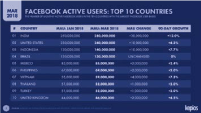Enough has been written over the past few weeks about the latest Facebook data-leak scandal, so when I settled to put together this piece, I decided not to write any more about it. Most of us have read enough about it, especially since it concerns a community of which we are members, some even with multiple accounts,
and we visit several times daily. Or have even subscribed to our kids becoming members, going to the extent of allowing them to mis-represent their age, since facebook in the interest of its members restricted membership
based on age thresholds.
A reader of my last article with this publication sent me a message appreciating some of my points therein, but at the same time “regretting deeply what had come about of the term ‘analytics’ in the wake of the Facebook
debacle”, even though I can hardly see why the term analytics which helps generate powerful insights out of data should get tainted, as I explained.
Also, interestingly, upon searching Google on the term ‘data’, over the past week, it invariably led to returning
‘facebook’ related stories among the top few searches.
All of the above, and this talk about the #deleteFacebook movement that has gained traction, served as inspiration for this article’s title. I shall not delve at length any further into the recent Facebook scandal which is under investigation by regulatory authorities and thus am in no position to comment, and would rather move on. Also, I must clarify that clearly my intent is not to defend either Facebook or Cambridge Analytica in all that has happened, especially with the founder of Facebook himself accepting that they erred.
ARE WE DENYING OURSELVES THE RIGHT GIVEN TO US :
There is no doubt whatsoever that automation and digitisation has led to large volumes of data being extracted, processed and analysed by software. While technology plays its role as an enabler, at some stage in the data chain there will always be humans involved in the execution, management or drawing of data and insights, and regrettably that is where levels of integrity come to play a role. So long as there are humans with varying levels of integrity, unfortunately data could fall into wrong hands, putting individual privacy at huge risk.
This ultimately makes us responsible as custodians of our own data and in how much we trust others, almost just as how we conduct ourselves in day-to-day life. Reality is that we generate data (and insights) from the time we wake up, throughout the day while driving, at work, exercising or even sub-consciously or unconsciously – think cookies, websites visited, built-in systems in cars, fitbits, spotify, meditation and all the other apps used.

Just as when we walk into a bank (another four letter word, interestingly), trust in such an institution is a foregone conclusion and pretty much taken as a hygiene factor, to the extent that we are handing them our hard-earned money, and we believe that if we can trust them with our money, surely we can trust them with anything else. Nevertheless, more often than not, we go through the fine print only to make sure that we are signing off on something that would not end up having any adverse implications since we’d be getting into financial transactions.
…REALITY IS THAT WE GENERATE DATA (AND INSIGHTS) FROM THE TIME WE WAKE UP, THROUGHOUT THE DAY WHILE DRIVING, AT WORK, EXERCISING OR EVEN SUB-CONSCIOUSLY OR UNCONSCIOUSLY – THINK COOKIES, WEBSITES VISITED, BUILT-IN SYSTEMS IN CARS, FITBITS, SPOTIFY, MEDITATION AND ALL THE OTHER APPS USED…
With cookies, we’re all being retargeted constantly – no sooner than have we exited from a website that may have reflected our interest in a product, we are subject to a ‘follow-me’ approach with banners appearing on almost every site we may visit thereafter, often to the point that we find this ‘spooky’ but may do little about it.
On apps like Spotify and Youtube, when we are retargeted with music or videos identified as being of ‘our type’ it comes as a ‘wow factor’ and a great personalisation feature, where we are being offered and served with content that ‘aligns with our taste’.
IT’S ULTIMATELY UP TO US
We all have choices to make and owe it only to ourselves to manage our privacy with some degree of responsibility, and no brand or community can take that basic right away from us, or has done so, including Facebook. Therein also lies the concept of ‘Permission Based Marketing’, which invariably marketers and brands exercise – by default we may invariably choose to be targeted or receive future communication, but will always have the right to refuse to receive such communication or even unsubscribe from it at any point
of time.
Although I started by saying that this piece is not about the ‘f-word’, since it is about exercising and fighting for privacy – and for now data seems to have become synonymous with Facebook – I do need to come back to the case of what’s become the new f-word in town. This is not defending this particular community for what happened and their wrong-doings, but it is reminding ourselves of our equal responsibility and right to safeguard our own data (through privacy settings) and still enjoy being part of the community rather than walk out of it through #deletefacebook, having already left our footprints there.
#DELETEFACEBOOK AND THE NUMBERS SPEAK :
If we ask from among the same people who voice subscribing to the movement of #deletefacebook, we can be reasonably sure that no one would have actually done so or left the community so far, even though facebook habits may have actually led many to unsubscribe from the daily newspaper. Ultimately, there’s no denying the fact that it’s almost become a part of us, be it for staying in touch with old friends or even catching up with news and entertainment. Facebook’s latest monthly active user (MAU) numbers, as also supported and corroborated by other industry statistics, suggest that very few people, if any, have actually ‘deleted’ Facebook. The USA and the UK have seen strong growth in Facebook user numbers in recent weeks, despite being home to the greatest number of people claiming that they’ll #deleteFacebook. The number of people using Facebook in India has jumped by 12 percent in just three months, despite Twitter users in the country posting more than 30,000 tweets containing the #deleteFacebook hashtag. To put it in right perspective and be fair, these figures don’t of course tell us what people are actually doing on Facebook though, and some of these active users may have logged in to their Facebook account simply to adjust their privacy settings.
#LIVEINACAVE AND THEFOUR-LETTER WORD
In summary, the right to invest in a product or be a part of something is an individual choice. To remind ourselves, having become constant data generators through all that we do, ‘data’ is a four letter word that’s here to stay, even once the f-word scandal has blown over. Unless of course some decide to start a movement and call it #liveinacave, where they would be even denied mobile phones without which admittedly we’d be
miserable humans on this planet, and often find it even hard to look back on those days gone by.
(Image source : kepios.com)
